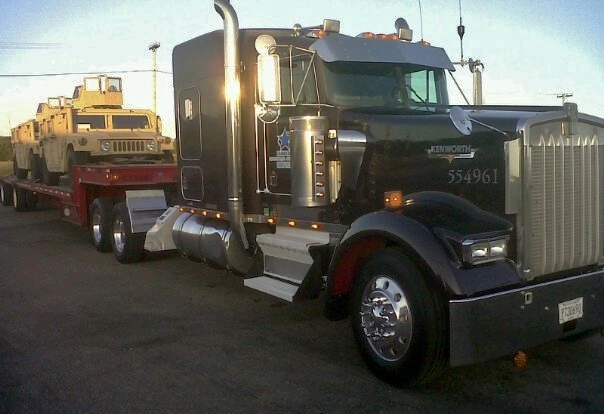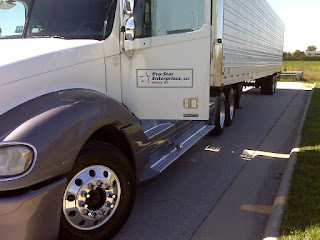Category: 2290 tax
Trucking Spotlight
Misconceptions about Filing Form 2290
Trucking Spotlight!
All About IRS Form 2290 (Truck Taxes)
IRS Form 2290 exists as a way to pay Heavy Vehicle Use Taxes, or HVUT, which must be filed with the IRS for any highway motor vehicle that exceeds a gross weight of 55,000 pounds. IRS Form 2290 also includes what is known as a Schedule 1, which is used to report all vehicles for which you are reporting tax (including an increase in taxable gross weight) and those that you are reporting suspension of the tax by category and vehicle identification number (VIN). The Schedule 1 may also be used as proof of payment to register your vehicle in any state. Use the stamped Schedule 1 that was returned to you by the IRS for this purpose.
Who Must File?
You must file a Form 2290 and Schedule 1 for the tax period beginning on July 1st, and ending on June 30th, if a highway motor vehicle is registered, or required to be registered, in your name under state, District of Columbia, Canadian, or Mexican law at the time of its first use during the period and the vehicle has a taxable gross weight of 55,000 pounds or more. Any type of business entity may file a Form 2290 with the IRS.
How much is the Tax?
There are three different categories for HVUT rates for these vehicles. Vehicles Below 55,000 pounds do not have HVUT because they do not qualify as a heavy vehicle. Vehicles between 55,000 and 75,000 pounds owe $100, plus $22 per 1,000 pounds over 55,000 pounds. Finally, for vehicles that are over 75,000 pounds the maximum HVUT is $550 per year.
The gross taxable weight is calculated by adding the following:
- Unloaded weight of vehicle, fully equipped for service.
- Unloaded weight of any trailers equipped for service and customarily used in combination with the vehicle
- Weight of the maximum load customarily carried on the vehicle and on any trailers customarily used in combination with the vehicle.
Who is Exempt?
Although it is rare, some Vehicles that fit the above description may be exempt from the HVUT and Filing requirements of Form 2290. To officially be exempt from filing Form 2290, the vehicle must be owned and operated by the following:
- The Federal Government
- The District of Columbia
- state or local government
- American National Red Cross
- Non-Profit Volunteer Fire Department, Ambulance Association, or Rescue Squad
- Indian Tribe Government (Only if the Vehicle is Used for essential Tribe or Government Function)
- Mass Transportation Authority (Only if granted certain powers normally exercised by the state)
- Qualified Blood Collector Vehicles
- Mobile Machinery that meets specifications for a chassis
There are several providers of services that can help you E-File Form 2290 with the IRS, one such provider is www.expresstrucktax.com. They provide a very excellent service for all Truck Tax Needs.
Truck Tax (form 2290) Legislation Has Been Passed!
Filing HVUT with Form 2290 in 2011
Since a stamped Schedule 1 is required to register a vehicle with the Department of Motor Vehicles, they will be accepting the HVUT proof of payment for the previous tax year of July 1, 2010 – June 30, 2011, to make things go as smoothly as possible this year. The IRS has informed taxpayers of the Form 2290 delay and the available options for payment once the form is available.
The following items may be accepted by the DMV as proof of HVUT payment until November 30, 2011:
- Original or copy of a Stamped Schedule 1 from the Form 2290 (electronically watermarked or manually stamped) for the previous tax year of July 1, 2010 – June 30, 2011.
- A copy of the IRS Form 2290 from the previous tax year, filed with the IRS as well as a copy of the front and back of the check to the IRS for the entire HVUT payment.
- Original or copy of an IRS Form 2290 (electronically watermarked or manually stamped), listing the vehicle as a “Credit Vehicle” for the previous tax year.
Once the IRS begins issuing the Form 2290 again, the process will revert to the normal procedures. The proof of HVUT payment will then be able to be sent to the DMV for any applications requiring HVUT verification.
This tax that the IRS collects is an annual tax on commercial motor vehicles that weigh
55,000 pounds or more. This is referred to as the taxable gross weight of a vehicle. Congress is in the process of extending the tax, and the previously mentioned due date exists as a temporary regulation that postpones the due date until November 30, 2011.
Although it is still not possible to file Heavy Vehicle Use Taxes with Form 2290 yet, the Truck Tax experts at Express Truck Tax will be available to answer any questions as well as help drivers and trucking companies file those taxes. For more information, visit the Express Truck Tax website or give the Truck Tax experts a phone call at 704-234-6005. You can also email any questions to support@ExpressTruckTax.com.
President Barack Obama Pushes for the Renewal of Transportation Bills
Among other things, the main focus of President Obama’s speech revolved around the necessity of renewing the Transportation Bill that is currently set to expire September 30. The primary arguments for extending the bill were that not extending it would cost up to a million jobs of hard working highway workers and extending the bill would also bring much needed tax revenue to fund road repairs and maintenance.
“Now is the time for Congress to extend the transportation bill, and keep our workers on the job. Now is the time to put our country before party and give certainty to the people who are trying to get by. There’s work to done. There are workers ready to do it. That’s why I expect Congress to act immediately.” said the President.
Video Link: http://www.c-spanvideo.org/program/ExtensionofTr
Trucking Industry Supports President Obama’s Push for Highway Funding
The current transportation legislation “The Safe, Accountable, Flexible, and Efficient Transportation Equity Act: A Legacy for Users” expired in 2009, but Congress has kept adding extensions to the legislation. The most recent one expires at the end of September. If it is not extended, or if new legislation is not enacted to replace it, the transportation industry will experience a shutdown similar to what the Federal Aviation Administration (FAA) experienced earlier this year.
If there is no immediate solution, the Transportation department will experience about 4,000 jobs to be furloughed without pay, and up to one million jobs if the delay is any longer. These are jobs for the people who build our roads and keep them safe. It would be detrimental and irresponsible to our highway system if this legislation is not kept in place.
The American Trucking Associations (ATA) came out in support of President Obama stating that Congress needed to quickly act on another extension, but more extensions are no replacement for a long-term highway solution. The ATA also urged the administration to use caution when using private sector funding for public infrastructure.
Soon after, The American Association of State Highway and Transportation Officials also released a statement in agreement with the ATA. Another organization that supported President Obama’s push for new legislation came as a surprise was OOIDA (Owner-Operator Independent Drivers Association). This was a bit surprising because OOIDA and the ATA have had a history of having a different opinion than the ATA. But as to this issue they have a similar viewpoint. They also agree that the government should try to avoid private sector funding for public transit.
This delay in the typical tax year for those filing Truck Taxes has affected an entire industry. Once an extension is passed or new legislation is enacted, those Truck Taxes will be able to be filed with Express Truck Tax at www.ExpressTruckTax.com. You can use this service to quickly EFile your Heavy Vehicle Use Taxes with Form 2290, 8849, IFTA and more! It only takes minutes to complete. If there are any questions, you can send them to (704)234-6005 or support@ExpressTruckTax.com.
Be Ready to File Form 2290 for Heavy Highway Vehicles
In order to make the filing process easier with the IRS using Form 2290, it is very important that you keep accurate records, just like you would when filing any other type of tax return. It is crucial for anyone filing form 2290 to maintain their records for at least 3 years prior to the filing date for any taxable highway vehicles registered to them. For fleet owners and small trucking companies who have filed form 2290 in the past, it is wise to always keep the 2290 records on hand, as one never knows when IRS inspection may take place. It is even important to save these returns if they are only for a part of a year. In the case of a suspended vehicle (public highway use was less than 5,000 miles/year) it is still necessary to keep records of Form 2290’s filed for them as well.
You will need to gather the following information before filing form 2290 to accelerate the filing process. You will need a description of all vehicles for which you are filing as well as a VIN (Vehicle Identification Number) for each one. You will also need to know the gross taxable weight of the vehicle. It is also necessary to report the date the vehicle was acquired, as well as the name and address of the previous owner. The first use month for the taxable period is also required for reporting. If a vehicle is considered to be suspended, keep a record of actual highway mileage. If the vehicle is an agricultural vehicle, then keep accurate records of the number of miles it is driven on a farm or field. Keeping proper records of your 2290 information will be a great help to you in the unfortunate event of an audit. It will also make the task of filing this form much easier.
ExpressTruckTax.com is an IRS authorized E-File provider who can help you file form 2290 as well as keep secure online records of previously filed form 2290’s. For more information on the 2290 filing process, heavy vehicle use tax, IRS payment methods, etc visit the Express Truck Tax website or call our Truck Tax experts at 704-234-6005. You can also email any questions to support@ExpressTruckTax.com.




